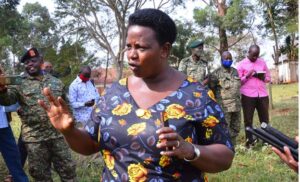Chimpanzee Conversation in Bugoma Forest can revamp Uganda’s tourism again after the alleged ADF backslide
In a nutshell, chimpanzee conservation in Bugoma Forest can be a revelation and the face of the tourism sector amidst the ADF backlash. Let us bird watch and walk nature in Bugoma.

By Guest Writer
Opinion: After robotically surviving the COVID-19 upset for over 2 years, Uganda’s tourism again faces the alleged ADF upset.
The shooting and killing of two foreign tourists and one Ugandan on October 17, 2023, has hit the world headlines. No doubt, this has had a knock on Uganda’s tourism sector, taking us back to the years of the pandemic that Uganda and the world have tried to let go of.
But this incident should not be the face of Uganda’s tourism sector, because it is common knowledge that Uganda is not just blessed with hospitable people but also has very beautiful, unique, God-given fauna and flora.
These protected areas are not just good for the eyes but rather make for breath-taking, perfect memories, and life-long living. Last week, I was in Murchison, for which I have many stories for the world to consider, but I will focus on the underrated tourism potentials in Bugoma Forest, particularly the Chimpanzee social souls.
While Bugoma Central Forest has traditionally faced challenges such as the expansion of small-scale agriculture, population growth, and others, deforestation and forest degradation challenges remain the greatest threats to forest survival. These challenges escalated when, in 2016, Uganda’s Ministry of Lands issued Bunyoro Kingdom with a freehold land title for the part of the forest that the kingdom claims.
Thereafter, the kingdom leased the land it claims to Hoima Sugar Ltd., which started destroying the forest in 2020. The satellite images from Maxar Worldview show that by March 3, 2022, approximately 2,800 hectares of the forest had been destroyed by the company.
The fact remains that 401.144 hectares of protected Bugoma remain the largest remaining block of natural tropical forest along the Albertine Rift Valley between Budongo and Semliki, playing an enormous role in preserving wildlife migratory corridors.
The forest is comprised of 257 different tree species and shrubs, 14 of which are on the IUCN red list, but the uniqueness is the Chimpanzee population of over 570, which potentially could make Uganda a tourist hotspot again and a revelation for Bugoma host communities to enjoy tourism-related advantages.
The uniqueness of Uganda’s chimpanzees is their high social behavior. They live with communities, other animals, and birds that everyone would love to see. They sleep in trees, particularly the Ugandan ironwood tree, which offers the firmest and most stable place of comfort, while building themselves nests of leaves.
The key takeaway is that they live in tropical rainforests. As we speak now, this tourism opportunity is ours to lose amidst the alleged ADF backline. The continued sugarcane plantations, illegal charcoal burning, oil and gas developments, and others are no doubt going to destroy the forest and natural habitat of chimpanzees, which could be the face of Uganda’s tourism sector, which not only contributes nearly 10% to Uganda’s GDP and is responsible for 23% of Uganda’s exports as well as earnings of as much as $1.6 billion but also employs over 667,000 people in Uganda.
I urge our government, through responsible ministries and agencies, to work with organizations and host communities to build awareness about the threats chimpanzees face, develop action plans to preserve their habitats, and help community members develop alternative livelihoods that do not jeopardize the animal’s habitat.
These threats are being driven by a lack of sufficient information on the green economic alternatives that can be harnessed while protecting the forest. If these alternatives are not developed, more sections of the forest could be destroyed due to competing land-use interests.
While I forget, I recommend the role of the National Environment Management Authority (NEMA) for ordering Hoima Sugar Limited in September last year to restore the degraded part of Bugoma, and my prayer, perhaps every nature-loving Ugandan prayer, is to enforce the same. To secure the future of chimpanzees in Bugoma, we must appreciate the laws under the Uganda Wildlife Act, Cap. 200.
It is high time we start discussions about declaring Bugoma Forest a national park to enjoy the breath-taking memories of life as we stir the economic development of Uganda through tourism revenues. This can be done by the minister of tourism, Hon. Col. (Rtd.) Tom R. Butime, by invoking his powers under the law.
In a nutshell, chimpanzee conservation in Bugoma Forest can be a revelation and the face of the tourism sector amidst the ADF backlash. Let us bird watch and walk nature in Bugoma.
The author, Brighton Aryampa, is an advocate of the High Court and Chief Executive Officer of Youth for Green Communities (YGC).
Disclaimer: We, as UG Reports Media LTD, welcome any opinion by anyone if it’s of constructive use to the development of Uganda. All the expressions and opinions in this write-up are not of UG Reports Media Ltd. but of the author of the article.
Would you like to share your opinion with us? Please share it with this email: theugreports@gmail.com.






